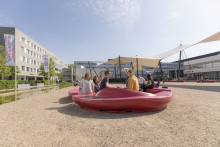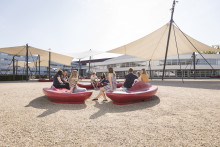The well-being survey was distributed among employees of the University of Twente in May and June this year.. The main results show that UT employees still are both highly engaged and strained. Most respondents are committed to their work and satisfied with the UT, on average they grade the UT with a 7.5 out of 10.
Workload
However, the perceived workload is still too high, especially among academic staff. 42% of the respondents indicated they have a (way) too high workload and 27% respondents take vacation days to finish work. This is comparable to the findings from 2021, showing that using vacation days and even calling in sick are common ways of how UT employees deal with workload.
According to the study, employees have too little time for research, while spending too much time on meetings, administration and teaching. The authors of the report therefore recommend to reduce meetings and administrative tasks and ensure a better dialogue on workload. BMS is the faculty with the highest perceived workload (50%). Of the service departments, SBD, M&C and LISA showed the highest perceptions of workload.
Figure showing the perceived workload for each faculty and department at the UT. Source: Results of the well-being study among UT employees Wave 1 (of 2) 2022.
The study also shows that extra attention should be paid to PhD candidates. ‘They score low on team cohesion and self-efficacy, implying that they might struggle with their projects on their own,’ states the report.
Hybrid working and inclusion
The 2022 well-being study reveals one new trend: Hybrid working has become the norm at the university. 82% of UT employees work partly from home and partly on campus. The preferences for working from home are diverse, however, the largest group wants to work 2-3 days from home.
For the first time, the well-being survey also included questions related to inclusion at the UT. It found out that ‘the large majority of UT employees are positive about inclusion (62%), especially on the ‘passive’ aspect of inclusion: the extent to which the team allows individuals to be authentic. The ‘active’ side of inclusion (‘my unit encourages me to be authentic’) has been answered a bit more hesitantly.’
Next wave
This study was only the first wave of the well-being research conducted this year. The second wave will be taken in the Autumn (October/November) and should also include questions related to inappropriate behavior at the UT.








